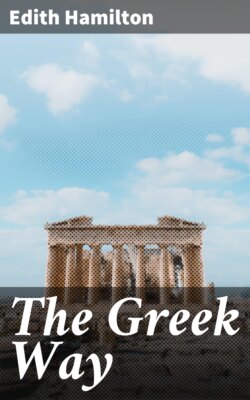Читать книгу The Greek Way - Edith Hamilton - Страница 3
На сайте Литреса книга снята с продажи.
PREFACE
ОглавлениеTable of Contents
The first edition of The Greek Way was an incomplete work. A number of the writers of the great age of Greece were discussed in it, but others quite as notable and important were omitted. The result was a picture of Greek thought and art at the time of their highest achievement with some of the very greatest thought and art left out; the poet Pindar, for instance, put by the Greeks themselves in the same class with Æschylus; the two historians, Herodotus and Thucydides, still foremost among the historians of the world. There cannot, indeed, be any real perception of the breadth and depth and splendor of the intellectual life in fifth-century Athens without some knowledge of Herodotus with his keen curiosity and warm humanity, and the profundity of thought and somber magnificence of Thucydides.
The present volume has made good the former omissions. All the writers of the Periclean age are considered.
I have felt while writing these new chapters a fresh realization of the refuge and strength the past can be to us in the troubled present. “Let us keep our silent sanctuaries,” Sénacour wrote, “for in them the eternal perspectives are preserved.” Religion is the great stronghold for the untroubled vision of the eternal; but there are others too. We have many silent sanctuaries in which we can find a breathing space to free ourselves from the personal, to rise above our harassed and perplexed minds and catch sight of values that are stable, which no selfish and timorous preoccupations can make waver, because they are the hard-won and permanent possession of humanity. “Excellence,” said Aristotle, “much labored for by the race of men.”
When the world is storm-driven and the bad that happens and the worse that threatens are so urgent as to shut out everything else from view, then we need to know all the strong fortresses of the spirit which men have built through the ages. The eternal perspectives are being blotted out, and our judgment of immediate issues will go wrong unless we bring them back. We can do so only, Socrates said in the last talk before his death, “when we seek the region of purity and eternity and unchangeableness, where when the spirit enters, it is not hampered or hindered, but ceases to wander in error, beholding the true and divine (which is not matter of opinion.)”
A great French scholar of the last century said to his class at the Collège de France shortly after Sedan and the triumphant occupation of Paris by the German army:
Gentlemen, as we meet here to-day we are in a free country, the republic of letters, a country which has no national boundaries, where there is neither Frenchman nor German, which knows no prejudice nor intolerance, where one thing alone is valued, truth in all her manifold aspects. I propose to study with you this year the works of the great poet and thinker, Goethe.
How noble and how tranquilizing. The eternal perspectives open out, clear and calm. Intolerance, hatred—how false they look and how petty.
“Beyond the last peaks and all seas of the world” stands the serene republic of what Plato calls “the fair and immortal children of the mind.” We need to seek that silent sanctuary to-day. In it there is one place distinguished even above the others for sanity and balance of thought—the literature of ancient Greece.
Greece and her foundations are
Built below the tide of war,
Based on the crystalline sea
Of thought and its eternity.
